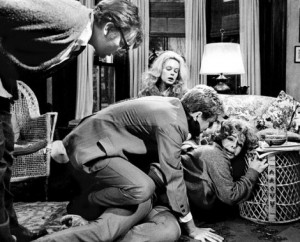Edward Albee’s play “Who’s Afraid of Virginia Wolff?” is a drama exploring the anxieties of modern life. By personalizing aspects of the epic Albee has inverted many of its features to create satire. This internalization pits individuals against each other and themselves. M. H. Abrams’s definition of epic, in his book “A Glossary of Literary Terms,” is used comparatively to demonstrate how Albee achieves satire.
Abrams’s first definition of epic is the closest to which “Who’s Afraid of Virginia Woolf?” adhere- it is about a serious subject. The seriousness of the play is developed through its language, which is not elevated or formal as in a traditional epic, rather, it is crude and intoxicated. When Nick and Honey arrive at George and Martha’s place they are sober and speak formally. Any hesitation they have comes from the unusual situation they find themselves in. As they drink, Nick and Honey’s involvement in the conversation becomes more fluid and the remarks become more poignant. This, in turn, increases the intensity of the insults between George and Martha. For them prodding is a game of one-upmanship with words their only weapon. As the play progresses the implications of this become increasingly serious.
of the play is developed through its language, which is not elevated or formal as in a traditional epic, rather, it is crude and intoxicated. When Nick and Honey arrive at George and Martha’s place they are sober and speak formally. Any hesitation they have comes from the unusual situation they find themselves in. As they drink, Nick and Honey’s involvement in the conversation becomes more fluid and the remarks become more poignant. This, in turn, increases the intensity of the insults between George and Martha. For them prodding is a game of one-upmanship with words their only weapon. As the play progresses the implications of this become increasingly serious.
In an epic, Abrams explains that the “fate of a tribe, a nation, or the human race” lies in the out come of the hero’s battle. The battle between George and Martha only affects their relationship and on this night spills into the lives of Nick and Honey. Drunkenness exaggerates their actions, so that the extremes of the situation are explored. This allows the reader to experience feelings which may be outside their own experience. George and Martha continually try to gain the upper hand in the relationship by degrading each other. This degradation is an fact a type of self loathing. For George it seems particularly acute. He can not come to terms with his past both because he is not able rid himself of it and Martha’s insistence on making it public – on her own terms. George wants to talk (or write) about his past and in so doing, let it go. This type of vulnerability is unheard of in a traditional hero, yet in this play is the basis of each character’s actions.
Abrams writes that the epic is centered around a “heroic or quasi-divine figure.” Albee has created an anthesis; George and Martha are pathetic characters. There is nothing heroic, and certainly nothing divine about them. All of their regret and unfulfilment come to the fore on this drunken night. George is bitter about not progressing within the college and Martha is unfulfilled with the life and status she has. Why, then, are they important characters when they are not, as in an epic, figures “of great national or even cosmic importance.” (54) In their degraded state, contemporary readers are able to sympathize with them in a more direct way then a traditional hero. Broader issues of state and humanity are often felt to be outside of their control. Motivation such as sacrifice for a greater good, which leads a traditional epic hero to action, would be unthinkable to George and Martha. The issue then is how an individual makes it through life. Because George and Martha are no more or less heroic than anyone else their struggles are common to all.
Unlike the sweeping grandeur on the epic, the setting of “Who’s Afraid of Virginia Woolf?” is modest. It is ironic that in a quiet, conservative “New England college town” the uncontainable and relentless attacks between George and Martha occur. This juxtaposition removes outside influences which might be considered as a reason for their actions. Albee further reduces the scope of the play by creating a very late evening within a single room which progresses in real time. This, again, reinforces the narrow focus of the play and heightens its tension.
By the end of the play the satire has given way to tragedy. While each of the four characters has some despicable characteristic, scorn turns to sympathy as George and Martha realize that all they have in the world, despite the misgivings, are each other. Morning over the loss of an imaginary child cuts through the ranting and raving to reveal unity and caring between Martha and George. Unlike the traditional epic this interior drama is able to communicate a more contemporary set of feelings which relate to modern life.
